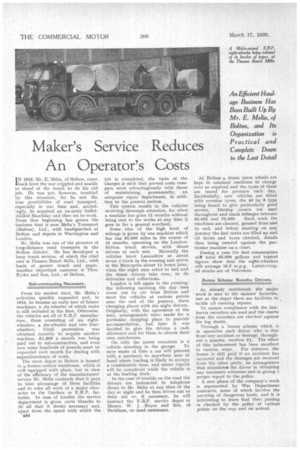Maker's Service Reduces An Operators Costs
Page 52

If you've noticed an error in this article please click here to report it so we can fix it.
An Efficient Haulage Business Has Been Built Up By Mr. E. Melia, of Bolton, and Its Organization is Practical and Complete Down to the Last Detail
IN 1919, Mr. E. Melia, of Bolton, came back from the war crippled and unable to stand at the bench to do his old job. He was not, however, troubled by this situation, for he saw the true possibilitiesof road transport, especially in war time and, accordingly, he acquired an ex-army bulletriddled Maudslay and then set to work. From that beginning has grown the business that is now Melia's Transport (Bolton), Ltd.., with headquarters at Bolton and depots in Warrington and London.
Mr. Melia was one of the pioneers of long-distance road transport in the Bolton district. He has developed a busy trunk service, of which the chief user is Thames Board Mills, Ltd., with loads of patent board and paper.' Another important customer is Thos. Ryder and Son, Ltd., of Bolton.
Su b-contr acting Necessary.
From his modest start, Mr. Melia's. activities quickly expanded and, in 1924, he became an early user of Saurer machines, a six-wheeler of which make is still included in the fleet. Otherwise, the vehicles are all of E.R.E. manufacture, these consisting of six eightwheelers, a six-wheeler and two fourwheelers. Until permission was obtained recently to acquire another machine, £1,800 a month was being paid out to sub-contractors, and even now some hundreds of pounds must be expended each month for dealing with superabundance of work.
The main depot at Bolton is housed in a former cotton warehouse, which is well equipped with plant, but in view of the efficiency ofthe manufacturers' service Mr. Melia contends that it pays to take advantage of these facilities and to refer all work of a major character to the Gardner or E.R.F. factories. In case of trouble the service department is given carte blanche to do all that it deems necessary and, apart from the speed with which the
534 job is completed, the basis of the charges is such that proved costs compare most advantageously with those of maintaining, permanently, an adequate repair department, in addition to the present section.
This system results in the vehicles receiving thorough attention, for when a machine has gone 12 months without being sent to the works at any time it goes in for a general overhaul.
Some idea of the high level of mileage is given by one machine which has run 82,000 miles in the course of 13 months, operating on the LondonBolton trunk service, with shunt drivers at each end. Normally the vehicles leave Lancashire at about seven o'clock in the evening and arrive in the Metropolis about 11 hours later, when the night men retire to bed and the shunt drivers take over, to do deliveries and collections.
Loudon is left again in the evening; the following morning the day men come out by car from Bolton and meet the vehicles at various points near the end of the journey, there changing places with the night drivers. Originally, with the agreement of the men, arrangements were. made for a particular stopping place to provide accommodation, but later it was decided to give the drivers a cash allowance and for them to choose their own rest-houses.
On only the rarest occasions is a vehicle standing in the garage. To save waste of time a car will proceed with a mechanic to anywhere near at hand where loading is likely to occupy a considerable time, and minor repairs will be completed while the vehicle is at the loading dock, In the case of trouble on the road the drivers are instructed to telephone direct to Mr. Melia at any time of the day or night and he then drives out to their aid or, if necessary, he will instruct the E.R.F. service depot or Messrs. W. J. Boyes and Son, of Peckham, to send assistance. At Bolton a dozen 'spare wheels are kept in constant readiness to change over as required and the tyres of these are tested for pressure each day. Incidentally, new vehicles are fitted with oversize tyres, the 40 by 8 type being found to give particularly good service. Dunlop covers are used throughout and reach mileages between 60,000 and 70,000. Each week the machines are cleaned, greased from end to end, and before starting on any journey the fuel tanks are filled up and oil levels and tyres checked, details then being entered against the particular machine on a chart.
During a year the fuel consumption will total 60,000 gallons and typical figures show that the eight-wheelers will average 10,7 m.p.g. Lubricatingoil stocks are of Valvolene.
Bonus Scheme Benefits Drivers.
As already mentioned, the major work is sent to the makers' factories, but at the depot there are facilities to tackle all running repairs.
To ensure compliance with the law, Servis recorders are used and the charts from the recorders are checked against the log sheets.
Through a bonus scheme which is in operation each driver who is free from any accident or damage, throughout a quarter, receives Al. The effect of this inducement has been excellent In various ways. For instance, the bonus is still paid if an accident has occurred and the damages are received from the other party, an arrangement that stimulate* the driver in obtaining any' necessary witnesses and in giving a proper report to the police.
A new phase of the company's work is represented by War Department contracts, some of which involve the carrying of dangerous loads, and it is interesting to learn that their passing is checked by the police at various points on the way and on arrival.




















































































